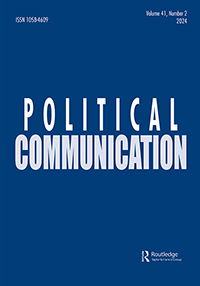谈判新闻:跨领域的浪漫伴侣如何选择、消费和讨论新闻
IF 5.1
1区 社会学
Q1 COMMUNICATION
引用次数: 0
摘要
摘要随着政治党派关系的加剧,恋爱关系中的政治相似性变得越来越普遍。尽管如此,对许多人来说,他们的恋爱关系是“跨领域的”,或者伴侣拥有不同的政治信仰,对他们来说,新闻的选择、消费和讨论可能尤其具有挑战性。从关于新闻曝光、共同观看和政治谈话的文献中,我考虑了跨领域浪漫伙伴关系对浪漫伴侣是否以及如何选择、消费和彼此讨论新闻的影响。通过对跨领域情侣的深度访谈(N = 67),我发现跨领域情侣在浏览新闻时经历了两种现象:a)协商曝光,即伴侣影响彼此选择和消费的新闻;b)两步冲突,即新闻内容、来源和数量引发了伴侣之间的冲突,而不仅仅是讨论。我考虑了这些现象对政治两极分化、新闻使用和政治讨论研究的影响,并主张这些研究领域在其方法中考虑关系背景。关键词:跨领域政治传播;新闻极化;深度访谈。IHS016699。披露声明作者未报告潜在的利益冲突。补充材料本文的补充数据可在出版商的网站https://doi.org/10.1080/10584609.2023.2270445Notes1上获得。该研究于2020年2月14日获得了IRB批准(# 54708)。这项工作得到了乔治梅森大学人文研究所的支持[IHS016699]。作者简介:emily Van Duyn(博士,德克萨斯大学奥斯汀分校),伊利诺伊大学厄巴纳-香槟分校传播系助理教授。她的研究探讨了人们接受信息和谈论(或不谈论)政治的语境。本文章由计算机程序翻译,如有差异,请以英文原文为准。
Negotiating News: How Cross-Cutting Romantic Partners Select, Consume, and Discuss News Together
ABSTRACTAs political partisanship intensifies, political similarity in romantic partnerships has become increasingly common. Still, there exist many for whom their romantic partnership is “cross-cutting,” or one in which partners hold dissimilar political beliefs, and for whom the selection, consumption, and discussion of news may be especially challenging. Drawing from literature on news exposure, co-viewing, and political talk, I consider the influence of cross-cutting romantic partnerships on if and how romantic partners select, consume, and discuss news with each other. Through in-depth interviews with individuals in cross-cutting romantic partnerships (N = 67), I find that cross-cutting couples experience two phenomena when navigating news: a) negotiated exposure, in which partners influence the news one another selects and consumes, and b) two-step conflict, in which news content, source, and volume spurred conflict, not only discussion, between partners. I consider the implications of these phenomena for the study of political polarization, news use, and political discussion, and advocate for these areas of research to consider relational contexts in their approach.KEYWORDS: Cross-cuttingpolitical communicationnewspolarizationin-depth interviews AcknowledgmentsThis work received support from the Institute for Humane Studies under grant no. IHS016699.Disclosure statementNo potential conflict of interest was reported by the author(s).Supplementary materialSupplemental data for this article can be accessed on the publisher’s website at https://doi.org/10.1080/10584609.2023.2270445Notes1. The study received IRB approval (# 54708) on February 14, 2020.Additional informationFundingThe work was supported by the Institute for Humane Studies, George Mason University [IHS016699].Notes on contributorsEmily Van DuynEmily Van Duyn (PhD, The University of Texas at Austin) is an assistant professor in the Department of Communication at the University of Illinois at Urbana-Champaign. Her research explores the contexts in which people receive information and talk (or do not talk) about politics.
求助全文
通过发布文献求助,成功后即可免费获取论文全文。
去求助
来源期刊

Political Communication
Multiple-
CiteScore
13.90
自引率
2.70%
发文量
30
期刊介绍:
Political Communication is a quarterly international journal showcasing state-of-the-art, theory-driven empirical research at the nexus of politics and communication. Its broad scope addresses swiftly evolving dynamics and urgent policy considerations globally. The journal embraces diverse research methodologies and analytical perspectives aimed at advancing comprehension of political communication practices, processes, content, effects, and policy implications. Regular symposium issues delve deeply into key thematic areas.
 求助内容:
求助内容: 应助结果提醒方式:
应助结果提醒方式:


